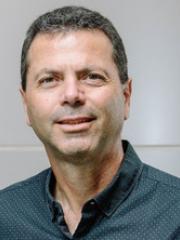Professor Mark Schembri

Primary research interest
Bacterial pathogenesis
About me
I completed my PhD at Monash University and postdoctoral studies at the Technical University of Denmark. In 2001, I was awarded a Postdoctoral Fellowship from the Danish Natural Sciences Research Council and was subsequently appointed to Lecturer. I joined The University of Queensland in 2004 as a Senior Lecturer and was promoted to Reader in 2007 and to Professor in 2010. I was awarded an ARC Future Fellowship in 2011.
Research focus and collaborations
The common research theme in my laboratory is the study of surface proteins that mediate adhesion, aggregation and biofilm formation by bacterial pathogens. Adhesion is the primary mechanism by which bacteria colonize host tissue surfaces and initiate disease. My research deals primarily with pathogenic Escherichia coli that cause intestinal and extra-intestinal infections. A major focus is uropathogenic E. coli (including multidrug-resistant strains), where we study the role of adhesins and other surface components in the development of biofilms and colonisation of the urinary tract. Biofilms are microbial communities characterized by cells that are irreversibly attached to a substratum or interface or to each other. My laboratory also investigates mechanisms of adhesion and biofilm formation by other multidrug-resistant pathogens including Acinetobacter baumannii, Klebsiella pneumoniae and Enterobacter species.
Collaborations
International: A/Prof Jean-Marc Ghigo, Pasteur Institute, France. Prof Scott Hultgren, Washington University School of Medicine, St. Louis, USA. Prof Tim Walsh, University of Cardiff, UK. Prof Ian Henderson, University of Birmingham, UK. Dr Mathew Upton, Univerity of Manchester, UK. Prof Tim Ravasi, KAUST, Saudi Arabia.
National: Dr Scott Beatson (UQ), Prof Alastair McEwan (UQ), A/Prof Matthew Sweet (UQ), Prof David Paterson (UQ), Prof Jenny Martin (UQ), Dr Rowland Cobbold (UQ), Dr Glen Ulett (Griffith), Dr Begoña Heras (LaTrobe), Prof Kate Moore (UNSW), Dr Darren Trott (U Adel).
Group members
- Dr Timothy Kidd, NHMRC Early Career Fellow
- Dr Alvin Lo, Postdoctoral Research Fellow
Funded projects
- NHMRC Project Grant 2014-2017, Functional and genomic analysis of the globally disseminated multidrug-resistant Escherichia coli ST131 clone
Total value of grant: $793,056 - NHMRC Project Grant 2013-2015, Role of autotransporter proteins in uropathogenic E. coli infections (M.A. Schembri)
Total value of grant: $590,222 - NHMRC Project Grant 2012-2014, Evolution and pathogenicity of NDM-1 positive Escherichia coli (M.A. Schembri, T.R. Walsh, S.A. Beatson)
Total value of grant: $622,350 - NHMRC Project Grant 2011-2013, Role of macrophages in uropathogenic E. coli infections (M.A. Schembri, M.J. Sweet, G.C. Ulett, T. Ravassi)
Total value of grant: $555,048. - NHMRC Project Grant 2011-2013, Escherichia coli ST131: an emerging pathogen (M.A. Schembri, S.A. Beatson)
Total value of grant: $555,048 - NHMRC Project Grant 2010-2012, Adhesins of uropathogenic Escherichia coli (M.A. Schembri)
Total value of grant: $391,125 - ARC Discovery Project 2010-2012, Disulfide catalysis and protein folding in bacterial virulence (M.A .Schembri, A.G. McEwan, B. Heras)
Total value of grant: $300,000. - ARC Discovery Project 2010-2012, Autotransporter proteins of enterohemorrhagic Escherichia coli O157:H7 (M.A. Schembri)
Total value of grant: $300,000 - National and International Research Alliances Program 2009-2011, Development of a livestock vaccine to reduce food-borne enterohemorrhagic E. coli (EHEC) infections in humans (R Cobbold, W Jorgensen, MA Schembri, T Mahony)
Total value of grant: $2,000,000
Teaching interests
- MICR3001 Microbes & Human Health
Student supervision
PhD: Principal Advisor 6, Associate Advisor 2 Honours: 1
Achievements and awards
Professional activities
- Fellow of the Australian Society for Microbiology (FASM)
Researcher biography
Professor Mark Schembri is a prominent microbiologist with experience in combating the global health crisis presented by multi-drug resistant pathogens. Professor Schembri's expertise on the virulence of bacterial pathogens and his innovative analysis of biofilm formation aims to improve the outcomes of the >400 million individuals that suffer from urinary tract infections each year across the globe.
Through the application of genetic, genomic and functional studies on uropathogenic E. coli, Professor Schembri has identified targets to reduce the virulence of this pathogen, and will pursue the development of life-saving therapeutic and preventative advances with the assistance of NHMRC, MRFF and ARC grants. Professor Schembri has tracked the rapid emergence and global spread of a virulent, drug-resistant E. coli clone and used genome sequencing to understand its evolution and virulence.
Links: Professor Schembri collaborates with national and international research leaders, including in Denmark, where he was a lecturer. Professor Schembri has strong links with other international experts in his field, including at the Pasteur Institute and the Wellcome Trust Sanger Institute in Cambridge. His research collaborations also span lead groups at UQ and other top Australian institutes, including Griffith and La Trobe Universities.
Membership, Funding and patents: Since 2014, Professor Schembri has been awarded over $15 million in funding from competitive national research funding bodies. He holds provisional patents for the development of novel therapeutic agents and vaccine antigens. He is a Fellow of the American Academy of Microbiology, and is regularly invited to speak at international conferences in his field.
Awards and Communication: Professor Schembri was the recipient of the Frank Fenner Award (2010) and the ASM BacPath Oration Award (2019) for his outstanding original research contribution to the study of Infectious Disease. He was an Australian Research Council Future Fellow (2011-2015) a National Health and Medical Research Council Senior Research Fellow (2016-2020). Professor Schembri is the author of >240 peer-reviewed research manuscripts. He is President of the Australian Society for Microbiology (2022-2026).
